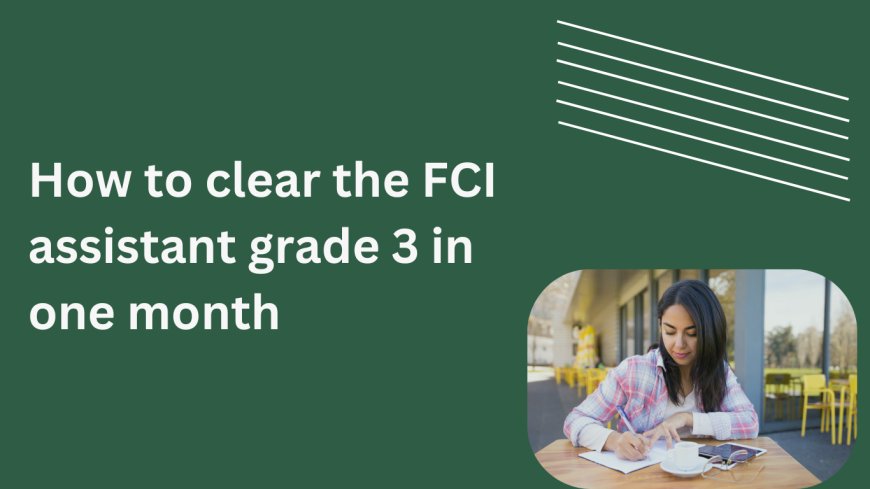How to clear the FCI assistant grade 3 in one month
This article provides a one-month preparation strategy to clear the FCI Assistant Grade 3 Exam. It covers the exam pattern, syllabus, and a detailed week-by-week plan to maximize your chances of success.

The FCI Assistant Grade 3 Exam is a popular exam conducted by the Food Corporation of India (FCI) to recruit candidates for various posts such as General, Accounts, Technical, and Depot. This exam is a gateway to a stable and rewarding career in one of the largest public sector organizations in India. With the right strategy and focused preparation, it is possible to clear the FCI Assistant Grade 3 Exam in one month.
In this article, we will discuss a step-by-step preparation plan, covering the syllabus, exam pattern, and tips to optimize your study routine. We will focus on key areas such as time management, study resources, and practice, which are crucial for success.
Understanding the FCI Assistant Grade 3 Exam
Before diving into the preparation strategy, it is essential to understand the structure and syllabus of the FCI Assistant Grade 3 Exam.
Exam Pattern:
The FCI Assistant Grade 3 Exam is conducted in two phases:
Phase I: Preliminary Exam
This phase consists of objective-type questions covering three sections:
English Language (30 questions, 30 marks)
Reasoning Ability (35 questions, 35 marks)
Numerical Aptitude (35 questions, 35 marks)
The total duration of the exam is 60 minutes.
Each question carries one mark, and there is a negative marking of 0.25 marks for each wrong answer.
Phase II: Main Exam
This phase is specific to the post applied for. For example, if you are applying for the Technical or Accounts posts, the syllabus will differ accordingly.
It consists of objective-type questions based on post-specific subjects, including General Studies, Management, Agriculture, and others.
Syllabus:
The FCI Assistant Grade 3 Syllabus for the Preliminary Exam covers:
English Language:
Reading Comprehension
Cloze Test
Error Spotting
Fill in the Blanks
Sentence Correction
Para Jumbles
Reasoning Ability:
Puzzles and Seating Arrangement
Coding-Decoding
Blood Relations
Direction Sense
Syllogism
Order and Ranking
Numerical Aptitude:
Number Series
Simplification and Approximation
Data Interpretation
Quadratic Equations
Ratio and Proportion
Percentage
Profit and Loss
Time and Work
Speed, Time, and Distance
Now that we have a clear understanding of the exam pattern and syllabus, let’s move on to the one-month preparation strategy.
One-Month Preparation Strategy
Week 1: Foundation Building
1. Analyze the Syllabus:
Start by going through the complete syllabus of both Phase I and Phase II (if applicable). Focus on the topics that are most frequently asked in the exam. Make a checklist of these topics and prioritize them.
2. Create a Study Plan:
Divide your time wisely among the three sections: English Language, Reasoning Ability, and Numerical Aptitude. Set daily and weekly targets to cover each topic. Allocate more time to the subjects you find challenging.
3. Study Material:
Use standard books like:
English Language: Wren and Martin, Word Power Made Easy, and practice from previous year papers.
Reasoning Ability: RS Aggarwal’s Reasoning Book, and practice puzzles from online resources.
Numerical Aptitude: Quantitative Aptitude by RS Aggarwal, and Arun Sharma’s books for DI and DS.
4. Focus on Basics:
Build a strong foundation by clearing your basics in each topic. Practice simple questions before moving on to more complex ones. This is crucial, especially for Numerical Aptitude and Reasoning.
5. Daily Practice:
Dedicate 2-3 hours daily to practicing mock tests and previous year question papers. Analyze your performance to identify your strengths and weaknesses.
Week 2: Intensive Practice and Revision
1. Practice Mock Tests:
Increase your mock test practice to at least one test per day. Focus on attempting full-length mock tests with a timer. This will help you manage your time effectively during the actual exam.
2. Topic-wise Revision:
Revise the topics covered in the first week. For English, focus on improving your reading speed and comprehension skills. For Reasoning, practice more puzzles and seating arrangements. For Numerical Aptitude, solve more data interpretation and arithmetic problems.
3. Strengthen Weak Areas:
Identify the topics where you are scoring less and focus on improving them. Spend extra time on these areas, and practice additional questions.
4. Learn Shortcuts:
For Numerical Aptitude, learn shortcut methods for calculation to save time during the exam. Practice these methods regularly to increase your speed and accuracy.
5. Stay Updated:
For the General Studies section in Phase II, keep yourself updated with the latest current affairs. Read newspapers daily and make notes of important events.
Week 3: Full-Length Tests and Advanced Practice
1. Full-Length Mock Tests:
Start taking two full-length mock tests daily, simulating the exam environment. Analyze each test thoroughly to understand your mistakes and improve.
2. Time Management:
Work on your time management skills. Try to complete each section within the allotted time during your mock tests. For example, try to finish the English section in 15 minutes, Reasoning in 20 minutes, and Numerical Aptitude in 25 minutes.
3. Advanced Practice:
For Reasoning, focus on high-level puzzles and critical reasoning. For Numerical Aptitude, solve complex DI sets and practice approximation techniques.
4. Focus on Accuracy:
While practicing, concentrate on accuracy rather than just speed. Avoid making silly mistakes, as there is negative marking in the exam.
5. Revise Regularly:
Keep revising the topics you have already covered. Do not start new topics in this week. Instead, solidify your understanding of the topics you have practiced so far.
Week 4: Final Revision and Strategy
1. Revise Important Formulas and Concepts:
Make a list of all the important formulas and shortcuts for Numerical Aptitude. Similarly, revise key rules for grammar and common vocabulary words for the English section.
2. Focus on General Awareness:
If you have applied for the Technical or Accounts post, revise your subject-specific topics thoroughly. Go through your notes and key points.
3. Last-Minute Tips:
In the last few days before the exam, do not overburden yourself. Stick to light revision and practice. Take adequate rest and maintain a positive mindset.
4. Exam Day Strategy:
On the day of the exam, start with your strongest section to build confidence. Keep track of time, and do not spend too much time on any single question. Attempt the questions you are sure about first, and then move on to the more difficult ones.
5. Stay Calm and Focused:
Remember, your hard work will pay off. Stay calm, focused, and confident during the exam.
Conclusion
Clearing the FCI Assistant Grade 3 Exam in one month is challenging but achievable with a well-planned strategy and consistent effort. Focus on understanding the exam pattern, covering the syllabus, practicing regularly, and revising effectively. Remember, consistency is key. With dedication and smart work, you can successfully clear the exam and secure a rewarding career with the Food Corporation of India.
If you’re preparing for upcoming bank exams, it’s important to stay focused and consistent with your studies. With exams like IBPS, SBI, and RBI just around the corner, it's crucial to have a clear strategy in place. Keep yourself updated with the latest exam patterns, focus on key topics like Quantitative Aptitude, Reasoning, and General Awareness, and practice regularly with mock tests and previous year papers. A well-planned preparation approach can help you achieve your goal and secure a career in the banking sector. Stay dedicated and keep pushing towards success!
What's Your Reaction?



















